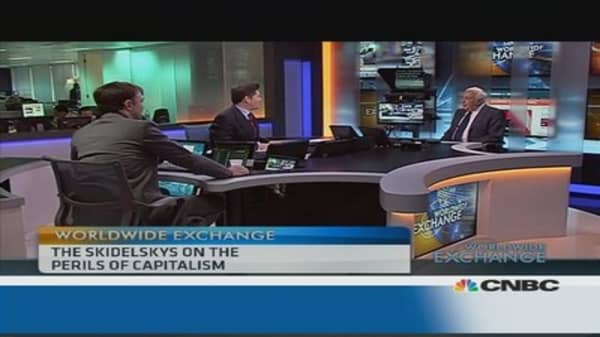The answer to the eternal question, Does money make you happy? is no, according to a new study analyzing the relationship between wealth and happiness.
"You ask the question 'can money make us happy,' and the evidence shows that it doesn't. The evidence we get is that we get richer and richer but we don't get any happier," Robert Skidelsky, the economic historian and co-author of a book on modern capitalism titled "How Much Is Enough?" told CNBC on Wednesday.
The "basic goods" that compose a happy life include health, education, leisure, friendship and harmony with nature, according to the book, which was written by Skidelsky, an emeritus professor of political economy at the University of Warwick, and his son, philosopher Edward Skidelsky.
(Read more: Scandinavians lead the way in world happiness)
They advocated that work should be breaks from leisure, rather than people taking breaks from work.
"A good life is a life that contains these basic goods and once you've got enough money for those, you have enough—so to carry on working for more is silly," Edward Skidelsky said.
(Read more: The perfect income for happiness? It's $161,000)
The book's conclusions echo the work of economist John Maynard Keynes, about whom the elder Skidelsky wrote a biography. In 1930, Keynes predicted that within a century per capita income would steadily rise and people's basic needs would be met, meaning that no one would have to work more than 15 hours a week.
"What has happened is that we have got a lot richer, but our workload has not actually dropped," Robert Skidelsky said. "We're on a treadmill, a work treadmill, a growth treadmill, for what end? We don't even ask the question. It's just more and more accumulation."
(Read more: Happiness matters, Merkel tells Germany)
"The job market is controlled by employers and not employees, so people don't have the power to set their own terms and conditions of work," Edward added.
The economic slump had caused more people to be dissatisfied and question the purpose of working, the Skidelskys said.
—By CNBC's Holly Ellyatt, follow her on Twitter @HollyEllyatt. Follow us on Twitter: @CNBCWorld




